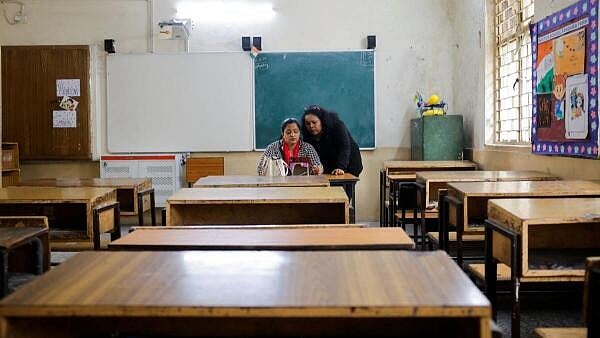
School teachers conduct online classes using a mobile phone in an empty classroom after schools were ordered shut by the Delhi government as Delhi's air quality worsened due to air pollution, on a smoggy morning in New Delhi.
Credit: Reuters Photo
New Delhi: The Supreme Court on Monday told the Commission for Air Quality Management (CAQM) in the national capital region and adjoining areas to consider resuming physical classes in schools and colleges but declined to relax the anti-pollution GRAP-4 (Graded Response Action Plan) restrictions in Delhi-NCR.
Examining the issue of air pollution, a bench of Justices Abhay S Oka and Augustine George Masih said that a large number of students did not have air purifiers at home and there would not be a difference between children at home and those attending schools.
The court felt that many students were deprived of mid-day meals and did not infrastructure to attend online classes.
Declining to relax anti-pollution measures, the bench said unless the court was satisfied that there was a consistent decrease in air quality index (AQI) levels, it could not order curbs below GRAP-3 or GRAP-2.
“Now the question is whether stage 4 norms need relaxation. Unless the court is satisfied that there is a consistent downward trend of AQI, we cannot permit the commission to go down to stage 3 or stage 2 pending further orders,” the bench said.
The court noted that anti-pollution GRAP-4 restrictions affected several sections of society, particularly the labourers and daily wagers, so it directed the state governments, where construction has been banned, to use funds collected as labour cess for subsistence to them.
Stage 4 of the GRAP is implemented when the AQI in Delhi reaches the severe-plus category, which is when it crosses 450.
The measures undertaken under GRAP-4 included stopping entry of trucks into Delhi, ban on construction and demolition activities for linear public projects such as highways, roads, flyovers, overbridges, power transmission, pipelines and telecommunication, discontinuance of physical classes in schools.
The court also pulled up the authorities for not enforcing the ban on entry of trucks in Delhi, a measure, which was imposed by the CAQM as part of its GRAP-IV measures to address severe air pollution.
The bench said the commission should initiate prosecution in terms of Section 14 of the CAQM Act against the officials, who failed to enforce the directives.
The court also voiced its displeasure with the deployment of a few police teams at a few entry points to stop the entry of trucks into the capital without any specific instruction.
The bench orally observed that it would direct the air quality commission to take action against the Delhi police commissioner under section 14 CAQM Act.
At the beginning of the hearing, the bench said without even seeing any report, it can be said that no checkpoints to regulate vehicles are in action.
Last week, the bench appointed 13 Supreme Court lawyers as court commissioners to visit the various entry points in Delhi to ascertain whether restrictions on the entry of trucks were implemented or not.
One of those counsel submitted though checking happened, it was not clear how effective it was, and stressed that there was no barricading at several checkpoints.
The bench further sought to know whether the commission or the Central government had issued specific instructions to the police. The bench was informed that orders were issued for 23 check posts.
The bench said that the report of the court commissioner indicated that at most of the entry points the police were posted pursuant to the order passed last week. "There has been a serious lapse by the authorities. Therefore, we direct the commission to immediately initiate action under Section 14 of the CAQM Act," the bench said.
